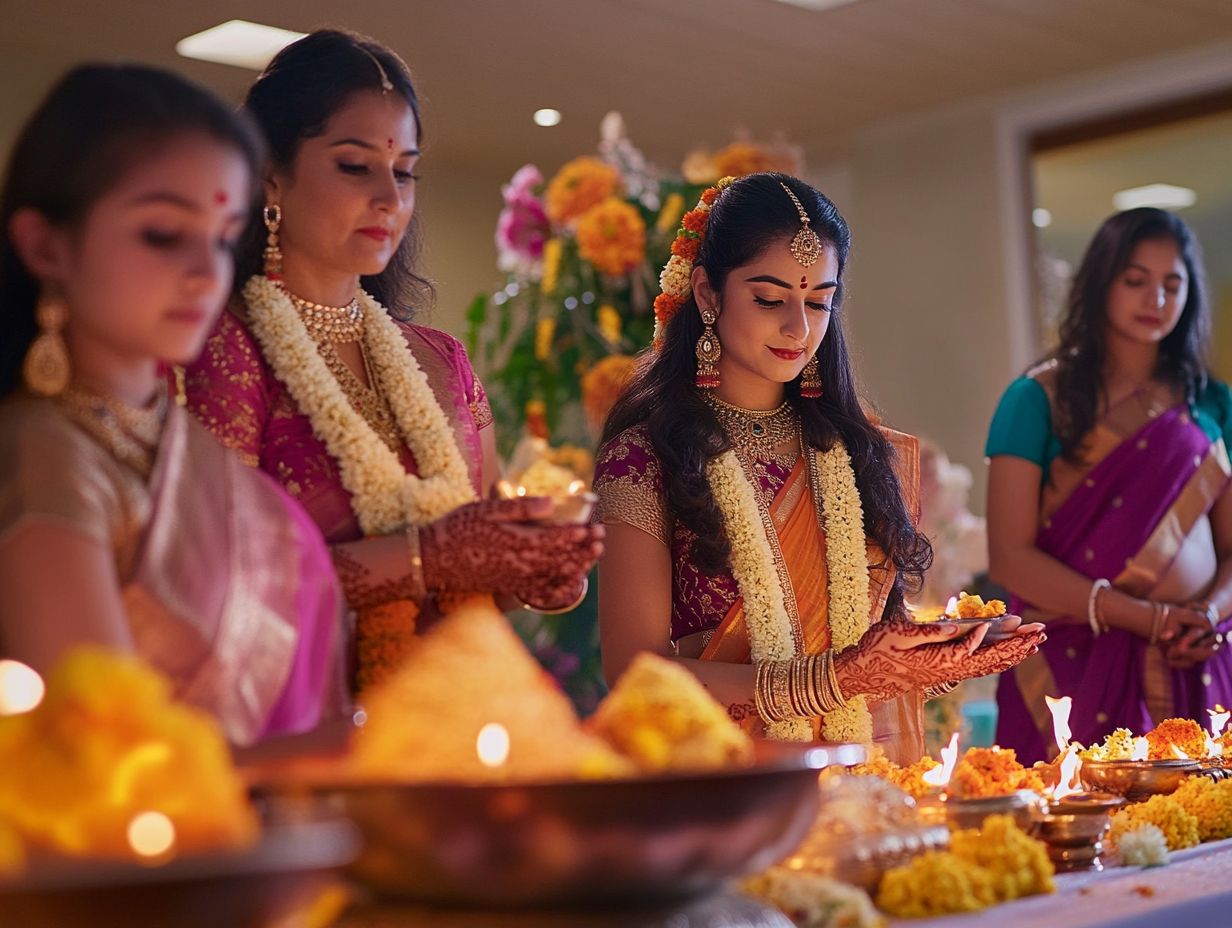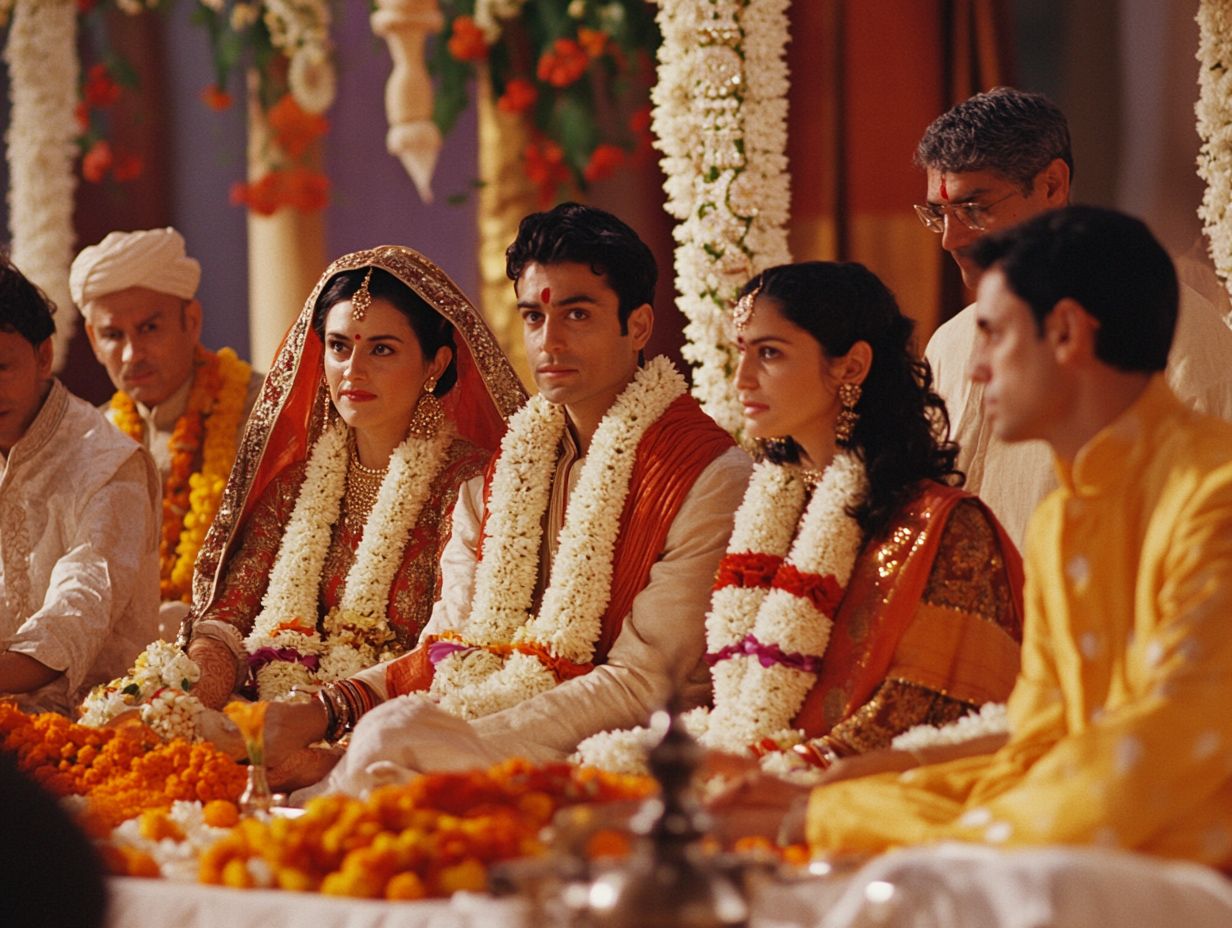Is Hinduism Ethnic or Universalizing?
Hinduism, recognized as one of the world’s oldest religions, possesses a profound richness in beliefs, practices, and rituals that significantly shape the lives of its adherents. Its influence extends to the social structure and community cohesion of its followers.
At the heart of its philosophy lie the core tenets of Dharma, Karma, Samsara, and Moksha, which serve as guiding principles for ethical behavior, spiritual advancement, and the pursuit of truth.
An exploration into whether Hinduism is classified as an ethnic or universalizing religion reveals its deep entrenchment in Indian culture, alongside its gradual expansion beyond its geographical origins. This examination also highlights the religion’s engagement with religious pluralism and inclusivity.
This inquiry invites an examination of the similarities and differences between ethnic and universalizing religions, illuminating the unique position that Hinduism holds within the broader context of global spirituality and religious tolerance.
What are the Core Beliefs of Hinduism?

Hinduism, recognized as one of the world’s oldest religions, stands as a profound ethnic religion that encapsulates a rich tapestry of beliefs and practices. Rooted in ancient sacred texts such as the Vedas and Upanishads, it provides guidance for individuals on their spiritual journey through essential concepts like dharma (duty), karma (action), samsara (the cycle of rebirth), and moksha (liberation). The belief in Brahman, the ultimate reality, and the practice of yoga and meditation are also integral to Hindu spirituality.
Rather than being a mere collection of doctrines, the belief system of Hinduism is intricately interwoven into daily rituals, diverse practices, and a vibrant spirituality that profoundly influences cultural identity, community life, and social cohesion.
1. Dharma (Duty)
Dharma, frequently rendered as ‘duty’, stands as a cornerstone of Hindu philosophy, intricately guiding individuals in their ethical and moral responsibilities within the framework of the caste system and gender roles. It also encompasses the moral codes and societal values that shape community life.
This multifaceted concept transcends mere actions, looking into the motivations and intentions that underpin decision-making. It underscores the necessity of fulfilling one’s obligations to oneself, to family, and to the broader community, reflecting a profound belief that ethical conduct fosters societal harmony.
The ramifications of dharma permeate various facets of life, shaping individual choices and influencing social dynamics. Its connection to cultural identity introduces an additional layer of complexity, as it often intertwines with the traditions and practices that characterize distinct communities.
As individuals navigate their life journeys, they continually interpret and apply the principles of dharma, striving to balance their personal aspirations with fundamental social responsibilities.
2. Karma (Action)
Karma, a cornerstone of Hinduism, embodies the law of cause and effect, positing that every action bears consequences that shape one’s future. This principle underscores the significance of ethical conduct and spiritual practices, suggesting that individual choices not only influence personal experiences but also intricately weave into the broader tapestry of society. It also connects deeply with the concept of reincarnation, offering a framework for spiritual evolution.
In Hindu philosophy, actions undertaken with intention and mindfulness are believed to yield positive outcomes in both the current life and future incarnations, creating a rich interplay of moral responsibilities and spiritual advancement. The concept of reincarnation is deeply intertwined with karma, offering individuals multiple lifetimes to learn, grow, and amend previous transgressions. This cyclical perspective also promotes community service and sustainable practices, aligning with the principles of karma yoga.
This cyclical perspective cultivates a community-oriented ethos, promoting a collective commitment to dharma, or moral duty, ultimately enhancing the spiritual well-being and harmony of society as a whole.
3. Samsara (Cycle of Rebirth)
Samsara, the cycle of rebirth, serves as a central concept in Hinduism, illustrating the soul’s continuous journey through various life forms, all shaped by karma. This framework encourages the pursuit of spiritual evolution and the ultimate quest for liberation. The Puranas and the Bhagavad Gita provide rich narratives that further explain samsara and the path to moksha.
The cycle embodies the belief that every action, thought, and intention influences future experiences, reinforcing the profound idea that today s ethical decisions can resonate through eternity. Closely intertwined with this belief is karma, the law of cause and effect, which dictates the quality of future lives based on past actions.
As individuals traverse this perpetual cycle of birth, death, and reawakening, the ultimate aspiration remains moksha the liberation from the cycle itself. Attaining moksha signifies not merely an end to suffering but also a momentous union with the divine, encapsulating the rich tapestry of existence within Hindu cosmology and the spiritual quest that lies at its heart. This journey is marked by various rites of passage and rituals that guide an individual through different stages of life.
4. Moksha (Liberation)
Moksha, or liberation, stands as the pinnacle of Hindu spiritual practice, embodying the release of the soul from the relentless cycle of samsara. This profound state is attained through the realization of one’s true self and a steadfast adherence to dharma, encompassing diverse paths such as bhakti, jnana, and raja yoga.
The pursuit of moksha encompasses a rich tapestry of spiritual practices designed to facilitate this profound inner transformation. Meditation emerges as an essential tool, allowing individuals to quiet their minds and explore the depths of self-awareness. Complementing this journey, yoga provides a physical discipline that nurtures strength, flexibility, and ultimately, spiritual insight. In addition, devotion, or bhakti, plays a pivotal role, cultivating a deep emotional connection to the divine that can inspire profound inner change. Pilgrimage to sacred spaces also forms an integral part of this spiritual quest.
Cultural heritage intricately shapes these practices, intertwining traditional values and teachings into the very fabric of one’s spiritual quest. Each path contributes uniquely to the journey toward enlightenment, guiding seekers toward liberation and fostering a harmonious existence.
Is Hinduism an Ethnic Religion?

Hinduism is frequently regarded as an ethnic religion, intricately linked to the cultural identity of the Indian subcontinent. It is characterized by its foundations in indigenous beliefs, customs, and sociocultural practices that have evolved over centuries, significantly shaping religious demographics both within the region and among the Hindu diaspora.
1. Definition of Ethnic Religion
An ethnic religion is defined by its profound connection to a specific cultural identity, often encompassing a variety of traditional practices, rituals, and a distinctive worldview intricately linked to the history and heritage of a particular group.
In contrast to universalizing religions, which aspire to disseminate their beliefs across diverse cultures and societies, ethnic religions tend to remain localized. They emphasize the significance of community, ancestry, and local customs. Such religions typically do not actively pursue converts; rather, they serve to reinforce the identity of those who are part of the culture. This distinction underscores the interplay between cultural heritage and religious identity.
A prime example of an ethnic religion is Hinduism, which is deeply rooted in the Indian subcontinent. Hinduism showcases a rich tapestry of beliefs and practices, including rituals associated with family life and festivals that celebrate agricultural cycles. This illustrates the profound connection between religion and the cultural heritage of its adherents, encompassing a wide range of community rituals and ancestral worship.
2. Hinduism’s Roots in India
Hinduism’s origins in India extend back thousands of years, representing a profound tapestry of cultural heritage and indigenous beliefs that have continually transformed and influenced the sociocultural fabric of the region. This evolution showcases the interplay between ancient traditions and modern interpretations.
From the ancient Vedic texts, regarded as some of the earliest sources of Hindu philosophy, to the myriad philosophical schools that have arisen over the centuries, the evolution of this faith is punctuated by significant historical milestones. Influential figures such as Vyasa, who meticulously compiled the Mahabharata, and Adi Shankaracharya, celebrated for his efforts in solidifying the Advaita Vedanta school, have left enduring legacies that shape its trajectory.
The rituals, festivals, and deities, deeply rooted in local traditions and customs, exemplify how Hinduism transcends mere spiritual guidance, embodying the collective identity and ethos of the Indian populace. This cultural integration is evident in the religious narratives found in the Puranas and the Bhagavad Gita.
3. Influence of Indian Culture on Hinduism
The influence of Indian culture on Hinduism is profound, as the religion seamlessly integrates a myriad of festivals, rituals, and communal practices that mirror the vibrant cultural tapestry of the nation. This intricate relationship between culture and spirituality highlights the significance of local customs and traditions in shaping spiritual beliefs and practices. The practice of pilgrimage to sacred geography further enriches this connection.
Festivals such as Diwali and Holi transcend mere religious observance; they embody the essence of regional customs, showcasing unique expressions of joy, love, and harmony. Rituals are often enriched by local art forms, music, and dance, crafting a rich tapestry that enhances the overall worship experience. These celebrations serve as poignant reminders of the intertwined nature of cultural identity and religious devotion, illustrating how deeply ingrained these practices are in the daily lives of individuals across India’s diverse communities and the Hindu diaspora.
Is Hinduism a Universalizing Religion?
Hinduism is predominantly recognized as an ethnic religion; however, it also embodies qualities of a universalizing faith. Its influence has transcended geographical boundaries through globalization, allowing it to embrace a myriad of spiritual paths that resonate deeply with individuals from diverse cultural backgrounds. The philosophy of Hinduism is deeply embedded in its sacred texts, such as the Vedas and Upanishads, which provide guidance on spirituality and belief systems.
1. Definition of Universalizing Religion

A universalizing religion seeks to appeal to all individuals, regardless of their cultural background. It is often characterized by inclusive beliefs and practices that transcend specific ethnic or cultural identities. Such faiths typically exhibit a missionary zeal, striving to disseminate their message widely, and often emphasize fundamental tenets such as equality and universal moral principles. Hinduism, through its concept of religious pluralism and religious tolerance, exemplifies these characteristics by respecting diverse traditions within its fold.
In contrast, ethnic religions are closely aligned with particular groups, deeply entwined with specific cultures and traditions, and do not actively pursue converts. Hinduism serves as a compelling example of this dynamic; although it is predominantly practiced by individuals of Indian ancestry and is deeply rooted in specific cultural contexts, it also possesses elements of universalism. Its diverse philosophies and spiritual practices resonate with people from various backgrounds. The influence of Hindu diaspora communities around the world has further enriched its practice and interpretation.
This duality highlights the complexity inherent in categorizing religions, revealing how some can embody both the distinctiveness of ethnic affiliation and the broader appeal of universal belief systems. The interplay between local customs and global practices in Hinduism exemplifies this complexity.
2. Hinduism’s Spread to Other Countries
Hinduism has extended its reach to numerous countries around the globe, largely propelled by globalization, migration, and the formation of Hindu diaspora communities that promote cultural assimilation and the exchange of religious practices. This spread has facilitated a rich intercultural exchange and has allowed Hinduism to integrate aspects of local beliefs and customs into its practice.
The movement of individuals from India and its neighboring regions, particularly in the aftermath of colonialism and in pursuit of economic opportunities abroad, has played a pivotal role in establishing this global presence. As these communities have settled in nations such as the United States, Canada, the United Kingdom, and Australia, they have upheld their traditions while simultaneously adapting to their new cultural environments. The Hindu diaspora has also played a significant role in maintaining community cohesion and religious identity in these countries.
Over time, this dynamic exchange has fostered a rich and diverse practice of Hinduism, transforming it into more than just a religion; it has evolved into a vibrant cultural identity that resonates within the broader tapestry of global faiths, illuminating the beauty of its philosophies and rituals. These include the celebration of various festivals, participation in pilgrimages to sacred spaces, and the worship of numerous Hindu gods in elaborate temples.
3. Emphasis on Individual Spiritual Journey
Hinduism places a profound emphasis on the individual spiritual journey, allowing practitioners to navigate their personal beliefs and practices, which may encompass everything from meditation to the worship of various deities, all tailored to their unique experiences. The study of sacred texts like the Bhagavad Gita and adherence to concepts such as karma and dharma are integral to this journey.
This journey is frequently characterized by personal reflections and an evolving understanding of one’s identity in relation to the universe. Each practitioner discovers solace in different facets of the faith, whether through engaging in rituals at home, attending temple ceremonies, or participating in community gatherings. Practices such as yoga and chanting further enrich this personal spiritual exploration.
The vast array of practices such as yoga, chanting, or the study of sacred texts enables individuals to sculpt their spiritual paths, fostering a sense of belonging while honoring their distinct preferences. Ultimately, this diversity within Hinduism inspires followers to cultivate meaningful connections with themselves and the divine, enriching their lives with both cultural and spiritual insights. The goal of achieving moksha or liberation, remains a central tenet of this journey.
Similarities and Differences between Ethnic and Universalizing Religions
Grasping the nuances that distinguish and connect ethnic and universalizing religions provides valuable insight into the intricate ways in which diverse belief systems intersect with cultural identity.
This understanding reveals how these religions shape religious practices across various societies, highlighting the complex interplay between faith and cultural context.
1. Common Elements in Ethnic and Universalizing Religions
Both ethnic and universalizing religions exhibit shared elements in their beliefs and practices, encompassing rituals, ethical guidelines, and community engagement, though these are expressed in culturally specific manners.
These commonalities lay a foundational framework for comprehending the essence of faith across a myriad of populations. Rituals, whether associated with seasonal changes or significant life events, are pivotal in strengthening communal ties and shaping individual identities. Ethical guidelines, often rooted in historical texts or oral traditions, mirror universal human values and serve as a moral compass that directs adherents in their everyday lives.
While universalizing religions strive to transcend cultural boundaries and appeal to a diverse array of followers, ethnic religions frequently underscore the significance of tradition and ancestry, cultivating a profound sense of belonging within particular communities. Ultimately, these practices not only enhance the spiritual journey but also illuminate the interconnectedness inherent in humanity’s pursuit of meaning. Hinduism’s caste system is an example of how cultural and social structures can shape religious practices and identities.
2. Key Differences between Ethnic and Universalizing Religions

The key distinctions between ethnic and universalizing religions can be found in their approaches to cultural identity, inclusivity, and the breadth of their beliefs and practices. Ethnic religions tend to be more localized, deeply intertwined with specific cultural groups, while universalizing religions strive for a broader appeal.
Ethnic religions, exemplified by Hinduism and Judaism, maintain strong connections to particular cultural communities, resulting in practices and traditions that vividly reflect the history and customs of those groups. Conversely, universalizing religions such as Christianity and Islam advocate teachings designed to transcend geographic and cultural boundaries, with the intention of attracting a global following. This distinction is key to understanding the role of religious demographics in shaping societal values and practices.
This divergence becomes particularly evident in their rituals. Ethnic religions may place significant emphasis on ancestral worship or nature-based practices that are rooted in local customs, whereas universalizing religions often concentrate on core doctrines and engage in missionary activities aimed at disseminating their message across diverse populations. Hinduism, with its myriad of religious festivals and community rituals, showcases the rich cultural tapestry of its followers.
Consequently, cultural identity plays a pivotal role in shaping the beliefs and practices of ethnic religions, while universalizing religions prioritize adaptability and inclusivity, seeking to resonate with a wider audience. Concepts like religious syncretism, the blending of various religious traditions, highlight this capacity to adapt and evolve.
Frequently Asked Questions
Is Hinduism Ethnic or Universalizing?
Hinduism can be considered both ethnic and universalizing, as it is practiced by people of diverse ethnicities, but also has elements that are specific to certain ethnic groups. The co-existence of various sects within Hinduism is a testament to its diversity and inclusivity.
What are some examples of ethnic practices in Hinduism?
Some examples of ethnic practices in Hinduism include certain rituals, customs, and traditions that are unique to specific ethnic groups within the larger Hindu community.
How does Hinduism differ from other ethnic religions?
Hinduism differs from other ethnic religions in that it does not have a strict set of beliefs or practices, and is instead characterized by its diverse traditions and beliefs that have evolved over time.
Is Hinduism open to converts?
Yes, Hinduism is open to converts, as it is a universalizing religion that welcomes people from all backgrounds and beliefs to practice its teachings. The process of religious conversion in Hinduism is often accompanied by rituals that signify the acceptance of the faith.
Are there any core beliefs in Hinduism that are universal?
Yes, there are some core beliefs in Hinduism that are considered universal, such as the concept of karma and the belief in the cycle of birth, death, and rebirth. Other fundamental beliefs include the pursuit of moksha and adherence to dharma.
Can someone of any ethnicity practice Hinduism?
Yes, anyone can practice Hinduism regardless of their ethnicity, as it is a religion that focuses on personal beliefs and spiritual growth rather than strict cultural or ethnic identities. This open approach aligns with Hinduism’s emphasis on religious tolerance and interfaith dialogue.
